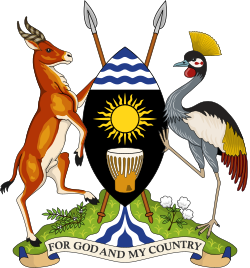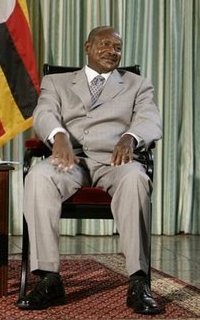
For God and my country

Population and religion
Economy and politics
Tourism
Ugandan cuisine
Economy and politics
Economy - The Bank of Uganda is the central bank of Uganda and handles monetary policy along with the printing of the Ugandan shilling.
In 2015, Uganda's economy generated export income from the following merchandise: coffee, oil re-exports, base metals and products, fish, maize, cement, tobacco, tea, sugar, hides and skins, cocoa beans, beans, simsim, flowers, and other products. In 2012, the World Bank still listed Uganda on the Heavily Indebted Poor Countries list.
Politics - The President of Uganda is both head of state and head of government. The president appoints a vice-president and a prime minister to aid him in governing.
The parliament is formed by the National Assembly, which has 449 members. These include; 290 constituency representatives, 116 district woman representatives, 10 representatives of the Uganda Peoples Defence Forces, 5 representatives of the youth, 5 representatives of workers, 5 representatives of persons with disabilities and 18 ex-official members. Uganda ranked as number 102 among the countries of the world in nominal Gross Domestic Product by the International Monetary Fund with a GDP of 26,349 (US$million).
Since the 1990s, the economy in Uganda is growing. Real gross domestic product (GDP) grew at an average of 6.7% annually during the period 1990–2015, whereas real GDP per capita grew at 3.3% per annum during the same period.
Economy - The Bank of Uganda is the central bank of Uganda and handles monetary policy along with the printing of the Ugandan shilling.
In 2015, Uganda's economy generated export income from the following merchandise: coffee, oil re-exports, base metals and products, fish, maize, cement, tobacco, tea, sugar, hides and skins, cocoa beans, beans, simsim, flowers, and other products. In 2012, the World Bank still listed Uganda on the Heavily Indebted Poor Countries list.

Politics - The President of Uganda is both head of state and head of government. The president appoints a vice-president and a prime minister to aid him in governing.
The parliament is formed by the National Assembly, which has 449 members. These include; 290 constituency representatives, 116 district woman representatives, 10 representatives of the Uganda Peoples Defence Forces, 5 representatives of the youth, 5 representatives of workers, 5 representatives of persons with disabilities and 18 ex-official members. Uganda ranked as number 102 among the countries of the world in nominal Gross Domestic Product by the International Monetary Fund with a GDP of 26,349 (US$million).
Since the 1990s, the economy in Uganda is growing. Real gross domestic product (GDP) grew at an average of 6.7% annually during the period 1990–2015, whereas real GDP per capita grew at 3.3% per annum during the same period.
Government of Uganda